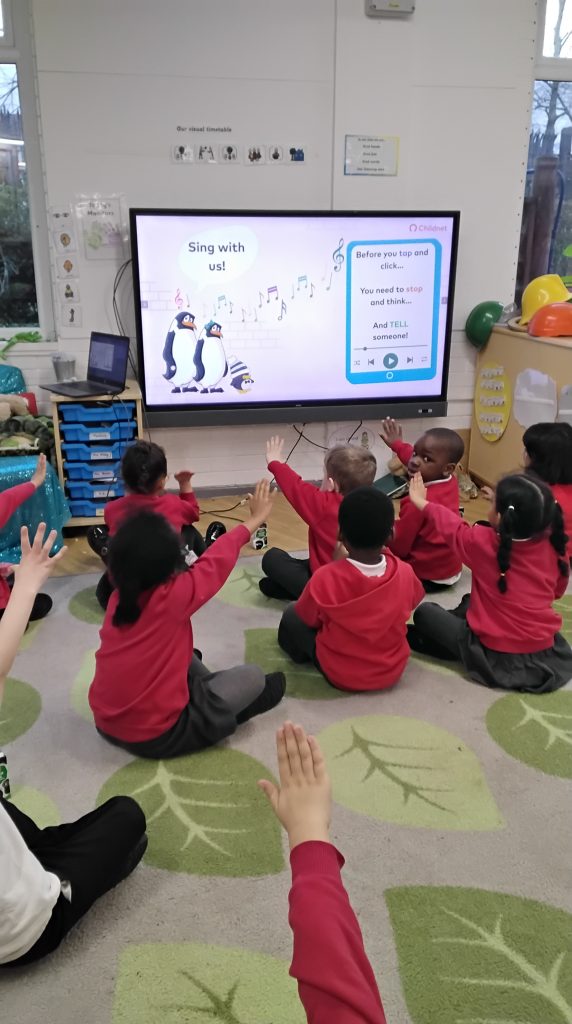Marking Internet Safety Day in Reception Class

We listened to a story about Smartie the penguin and learnt a song to help keep us safe online.
44“For I know the plans I have for you,” declares the Lord, “plans to prosper you and not to harm you, plans to give you hope and a future.”
Jeremiah 29:11
Learning about technology and computer skills equips our children with the tools they need for their future, encouraging them to embrace these opportunities as part of God’s plan for their lives.
Catholic Social Teaching is integral to our whole curriculum. Here are some examples of where this can be seen in Computing:
Solidarity and the Common Good – we recongise that computers connect us globally allowing us to help one another online.
Dignity of the Human Person – As every human is made in the image of God, we have duty to treat everyone with dignity and respect online.
The Option for the Poor and Vulnerable – by teaching computing to all children at St. Clare’s, we are giving everyone a fair start in life to understanding the cyber/ global world.
Intent
The intent of our computing curriculum is to deliver a curriculum which is accessible to all and that will maximise the development of every child’s ability and academic achievement in computing. We want our children to know more, remember more and understand more in computing so that they leave primary school computer literate. Computing skills are a major factor in enabling children to be confident, creative and independent learners and it is our intention that children have every opportunity available to allow them to achieve this.
The key intentions for our computing curriculum are to:
• build a computing curriculum that develops pupil’s learning and results in the acquisition of knowledge of the world around them;
• design a curriculum with appropriate subject knowledge, skills and understanding as set out in the National Curriculum so that children can reach and exceed their potential in the key strands of information technology, computer science and digital literacy;
• build a computing curriculum that prepares pupils to live safely in an increasingly digital British society;
• prepare pupils for the challenges posed by digital systems in a modern British society.
Implementation
Technology is changing the lives of everyone. Through teaching Computing, we equip children to participate in a rapidly-changing world where work and leisure activities are increasingly transformed by technology. At St. Clare’s, teachers plan, teach and assess using the Purple Mash Computing scheme of work. By teaching these progressive units, the pupils gain a knowledge and understanding of all areas of the computing curriculum including digital literacy; computer science; information technology and online safety.
We ensure that all children are provided with rich and stimulating learning experiences that aim to:
• offer our pupils a broad and balanced curriculum that prepares them to use ‘computational thinking and creativity to understand and change the world’;
• enable pupils to understand and apply the fundamental principles and concepts of computer science, including abstraction, logic, algorithms and data representation;
• equip pupils to analyse problems in computational terms, and have repeated practical experiences of writing computer programs in order to solve such problems;
• allow opportunities for pupils to evaluate and apply information technology, including new or unfamiliar technologies, analytically to solve problems;
• empower pupils to be responsible, competent, confident and creative users of information and communication technology.
Impact
Our approach to the curriculum results in a fun, engaging, and high-quality computing education. The children at St. Clare’s will leave equipped, not only with the skills and knowledge to use technology effectively and for their own benefit, but more importantly – safely. The biggest impact we want on our children is that they understand the consequences of using the internet and that they are also aware of how to keep themselves safe online. As children become more confident in their abilities in Computing, they will become more independent and key life skills such as problem-solving, logical thinking and self-evaluation will become second nature.